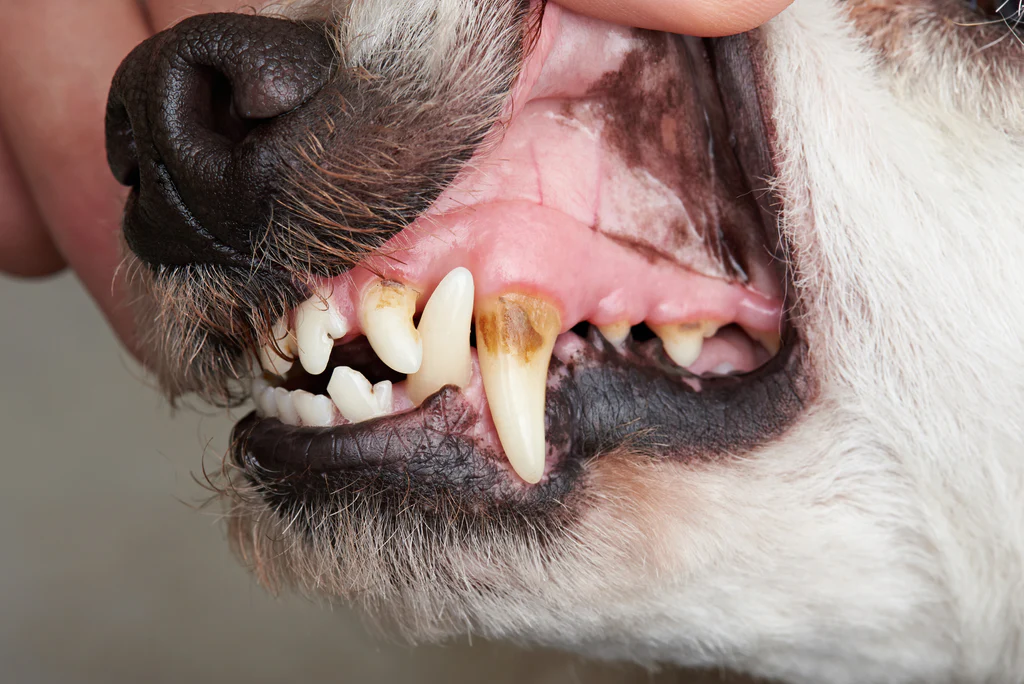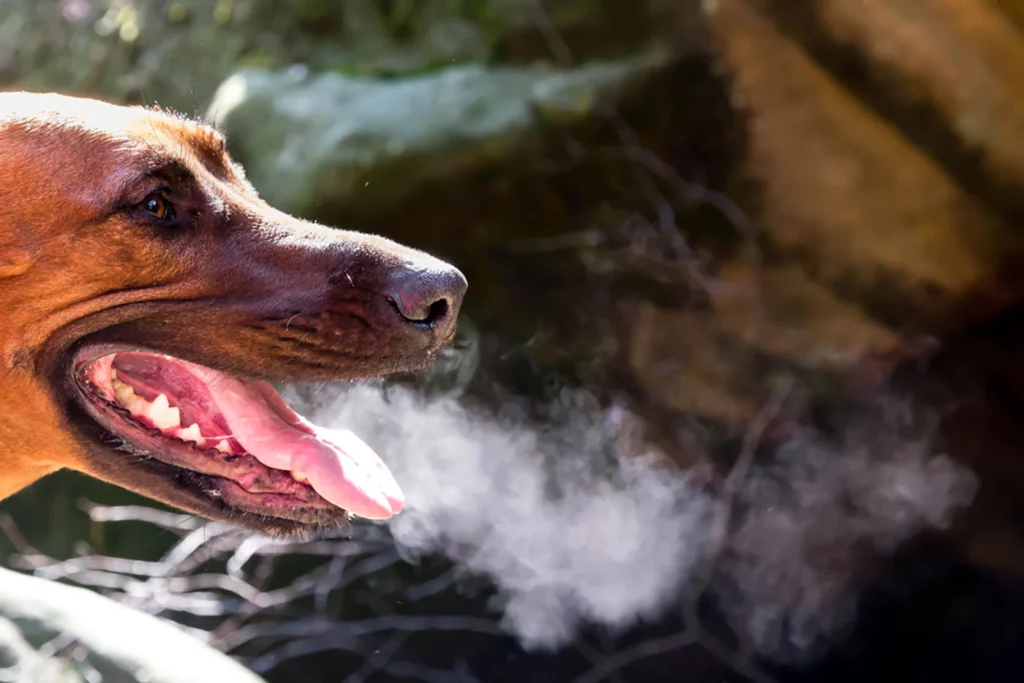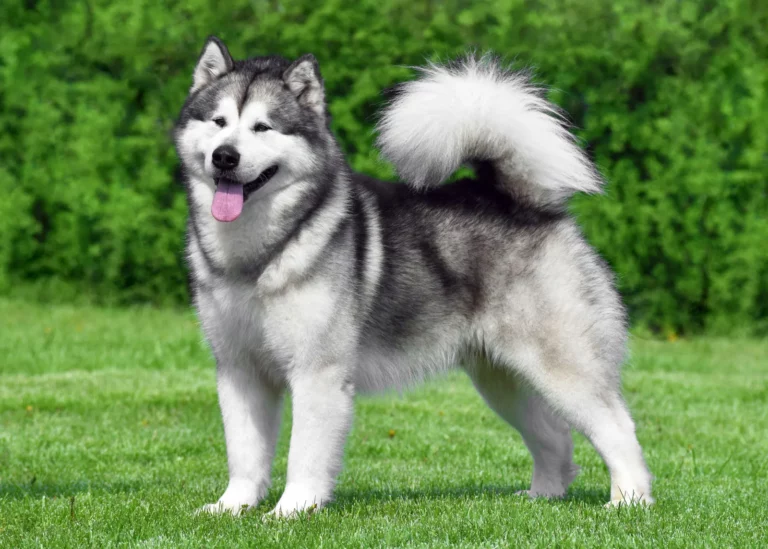Why Does My Dog’s Breath Smell Like Fish? Causes & Solutions
If you’ve noticed your dog’s breath smelling fishy, it’s not only unpleasant but could signify a health issue. Understanding the causes and addressing this problem is crucial to your dog’s comfort, preventing serious health issues, and improving your interactions with your pet.
This blog post will guide you through the causes and practical solutions for eliminating your dog’s fishy breath.
Key takeaways
Oral Hygiene: Dogs can develop fishy breath due to poor oral hygiene. Regular teeth brushing can help.
Diet: Some dog foods may result in fishy breath. Evaluating and adjusting their diet could be beneficial.
Health issues: Conditions like gum disease or gastrointestinal issues can cause bad breath. If unsure, consult a vet.
Anal Glands: Fishy breath can sometimes be linked to issues with a dog’s anal glands.
Prevention: Regular vet visits, good oral care routine, and a balanced diet can help prevent fishy breath.
Common Causes of Fishy Breath in Dogs
Anal gland issues
Function of anal glands: Anal glands are small, scent-producing sacs located on either side of your dog’s anus. They naturally secrete a smelly, fishy substance during defecation or when your dog is scared or excited. This scent serves as a means of communication and territory marking among dogs.
Signs of anal gland problems: If your dog’s anal glands are not emptying properly or become infected, the fishy odor may become more noticeable. Some signs of anal gland issues include scooting, licking the rear area, or swelling near the anus.
How it affects breath: Dogs may lick their anal area when experiencing discomfort or irritation, transferring the fishy smell to their mouth and causing their breath to smell like fish.
Oral health problems
Plaque and tartar buildup: Plaque is a sticky film that forms on teeth and, if not removed, hardens into tartar. Both plaque and tartar can lead to bad breath, including a fishy odor, if left untreated.
Periodontal disease: Untreated plaque and tartar can lead to gum inflammation (gingivitis) and eventually periodontal disease. This condition results in the breakdown of gum tissue and supporting bone structure, often causing foul-smelling breath.
Tooth decay or infections: Damaged or decaying teeth can harbor bacteria, which produce unpleasant odors. Infections in the mouth, such as abscesses, may also contribute to a fishy smell in your dog’s breath.

Diet and food choices
Fish-based diets: Some dog foods are made with fish ingredients, which can result in a fishy smell in your dog’s breath. This is usually harmless and can be resolved by switching to a non-fish-based diet if the odor is bothersome.
Low-quality food and additives: Inexpensive dog foods may contain lower-quality ingredients and artificial additives that can contribute to bad breath. Feeding your dog a high-quality diet can help alleviate this issue.
Coprophagia (eating feces): Some dogs may eat their own feces or those of other animals. This habit not only leads to bad breath but can also introduce harmful bacteria into your dog’s mouth.
Gastrointestinal issues
Bacterial imbalances: An imbalance of bacteria in your dog’s gut can result in the production of foul-smelling gases, which may contribute to a fishy odor in their breath.
Gastroesophageal reflux: If your dog suffers from acid reflux or other gastrointestinal issues, stomach acid can travel up the esophagus and cause a fishy or sour smell in their breath.
Preventing and Eliminating Fishy Dog Breath
Regular grooming and dental care
Importance of brushing teeth: Just like humans, dogs need regular dental care to maintain good oral hygiene. Brushing your dog’s teeth at least a few times a week can help remove plaque and prevent tartar buildup, reducing the risk of bad breath and more serious dental issues.
Dental chews and toys: Dental chews and toys are designed to help clean your dog’s teeth as they chew. Providing these items can help reduce plaque and tartar while also keeping your dog entertained and promoting healthy chewing habits.
Professional dental cleanings: Schedule regular dental cleanings with your veterinarian to ensure your dog’s teeth and gums stay in top shape. This will not only help eliminate fishy breath but also prevent potential oral health issues from developing.
Proper nutrition
Choosing high-quality dog food: Opt for a high-quality, well-balanced dog food that contains easily digestible ingredients and avoids artificial additives. This can help minimize bad breath and support your dog’s overall health.
Avoiding fish-based diets if necessary: If your dog’s fishy breath is linked to their diet, consider switching to a non-fish-based food. Consult your veterinarian for recommendations that meet your dog’s specific nutritional needs.
Incorporating fresh fruits and vegetables: Adding dog-safe fruits and vegetables to your dog’s diet can help freshen their breath and provide additional nutrients. Examples include apples, carrots, and green beans.
Addressing anal gland problems
Regular vet check-ups: Schedule routine check-ups with your veterinarian to monitor your dog’s anal gland health. Your vet can detect and address any potential issues before they worsen, reducing the chance of fishy breath.
Expressing anal glands when needed: If your dog’s anal glands are not emptying properly, your vet may recommend expressing them manually. This can help alleviate discomfort and reduce the fishy odor associated with impacted or infected glands.
Maintaining a healthy weight: Obesity can contribute to anal gland issues in dogs. Ensuring your dog maintains a healthy weight through proper diet and exercise can help prevent these problems and the associated fishy breath.
Monitoring gastrointestinal health
Probiotic supplements: Probiotics can help balance the bacteria in your dog’s gut, potentially reducing fishy breath caused by bacterial imbalances. Consult your veterinarian for guidance on choosing a suitable probiotic for your dog.
Regular vet visits for checkups: Keep up with your dog’s regular veterinary check-ups to monitor their gastrointestinal health. Your vet can detect and address any potential issues early on, helping to maintain your dog’s overall well-being and minimize the chance of fishy breath.

When to Seek Professional Help
Symptoms of serious oral health issues
While some level of bad breath is normal in dogs, it’s crucial to recognize when the issue may be indicative of more significant health problems. If your dog’s fishy breath is accompanied by symptoms such as swollen, red, or bleeding gums, loose teeth, or difficulty eating, it’s time to consult your veterinarian.
These signs could indicate severe dental issues that require professional attention.
Signs of chronic anal gland problems
If your dog is persistently scooting, licking their rear area, or showing signs of discomfort around their anus, it may indicate chronic anal gland issues. In these cases, it’s essential to seek veterinary care to diagnose and address the problem, which could include infection or impaction.
Ignoring these issues can result in worsening symptoms and further complications.
Persistent fishy breath despite intervention
If you’ve tried the preventative and care measures outlined above and your dog’s fishy breath persists, it’s essential to consult your veterinarian. Persistent bad breath could signal an underlying health issue that requires professional diagnosis and treatment.
By seeking help, you can ensure your dog’s well-being and keep their breath smelling fresh and clean.
Frequently Asked Questions
How often should I brush my dog’s teeth to prevent bad breath?
To prevent bad breath, it’s best to brush your dog’s teeth at least a few times a week. Daily brushing is ideal for optimal dental hygiene, but even brushing a few times a week can significantly reduce plaque buildup and minimize the risk of bad breath and other dental issues.
Can certain dog breeds be more prone to fishy breath?
While any dog can develop fishy breath, some breeds may be more susceptible to dental issues or anal gland problems that contribute to the odor.
For example, small or toy breeds are often more prone to dental problems due to their crowded teeth, while overweight dogs or dogs with short, stocky bodies may be more likely to experience anal gland issues.
Are there specific dental chews or toys that work best for preventing bad breath?
There are many dental chews and toys available that can help prevent bad breath by reducing plaque and tartar buildup. Some popular options include enzymatic chews, which contain enzymes that break down plaque, and textured rubber toys designed to clean teeth as your dog chews.
It’s essential to select a dental chew or toy that is appropriately sized and suited to your dog’s chewing strength to ensure effectiveness and safety.
How can I tell if my dog’s fishy breath is caused by an anal gland issue?
If your dog’s fishy breath is accompanied by signs of anal gland issues, such as scooting, excessive licking of the rear area, or visible swelling near the anus, it may indicate that the odor is due to anal gland problems. A veterinarian can diagnose and treat anal gland issues, helping to resolve the fishy breath issue.
Are there any home remedies for addressing fishy breath in dogs?
There are a few home remedies that can help improve your dog’s breath. Offering dog-safe fresh fruits and vegetables, such as apples, carrots, or green beans, can help to freshen their breath.
Additionally, you can create a homemade mouthwash using water and a few drops of dog-safe essential oils like peppermint or spearmint, and gently swab your dog’s mouth with the solution using a soft cloth or cotton ball.
However, it’s crucial to address the underlying cause of fishy breath, so it’s essential to consult with your veterinarian and follow a proper dental care routine for your dog.
Final Thoughts
Fishy breath in dogs can be a sign of various issues, ranging from relatively harmless dietary choices to more serious dental or gastrointestinal problems. Understanding the potential causes of your dog’s fishy breath is the first step in addressing the issue and ensuring your pet’s overall health and well-being.
Taking proactive steps to prevent and address fishy breath in dogs is essential for maintaining their comfort and happiness. Regular dental care, proper nutrition, addressing anal gland problems, and monitoring gastrointestinal health are all crucial components of keeping your dog healthy and free of fishy breath.
By incorporating these measures into your pet care routine, you can ensure your dog’s breath stays fresh, making your interactions with them more enjoyable and fostering a stronger bond between you and your furry friend.






